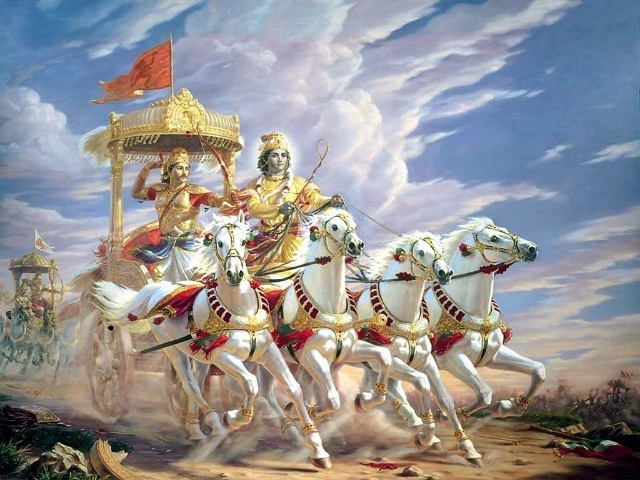THE GLORY OF THE EPIC, MAHABHARATA
The great Indian epic, Mahābhārata, which contains 100,000 verses and is considered to be the world’s longest epic poem (it is more than seven times the combined size of Homer’s Iliad and Odyssey).[1] Its claim to greatness, however, does not rest on its length but on the depth and breadth of its message.
It has been rightly said about the Mahābhārata, “Whatever is here, on Law, on Profit, on Pleasure, and on Salvation, is found elsewhere. But what is not here is nowhere else.”[2]
The great spiritual text, the Bhagavad Gītā, is embedded within the Bhīṣma Parva (the Book of Bhīṣma) within chapters 25-42.
A. R. Orage, the British philosopher, whom George Bernard Shaw once called the “the most brilliant English editor and critic of last 100 years,”[3] studied Mahābhārata concertedly for 15 years. He believed that it contains absolute truths emanating from Objective and Universal Consciousness. Orage extolls it as follows:
The Mahabharata is the greatest single effort of literary creation of any culture in human history. The Iliad and the Odyssey are episodes in it; and the celebrated Bhagavad Gita is simply the record of a single conversation on the eve of one of its many battles….(It is) the most colossal work of literary art ever created. It contains every literary form and device known to all the literary schools, every story ever enacted or narrated, every human type and circumstance ever created or encountered.
Unlike the reading of derivative works of art, the reading of the Mahabharata is a first-hand experience. One ends it differently, just as one emerges differently from everything real. The Mahabharata towers over all subsequent literature as the pyramids look over the Memphian sands….More real Mysticism can be gathered from the Mahabharata than from the whole of modern mystical writings. [4]
A.R. Orage was a great admirer of Indian Wisdom. He is reported to have requested that the first half of verse 16 of chapter 2 of the Gītā should be inscribed on his gravestone:
नासतो विद्यते भावो नाभावो विद्यते सतः ~BG 2.16
nāsato vidyate bhāvo nābhāvo vidyate sataḥ:
The unreal has no being;
the Real never ceases to be.
Orage considered this half-verse to be the highest expression of perennial philosophy, philosophia perennis.
The legendary author of the epic Mahābhārata , Veda Vyāsa, when asked about the most important single verse that represented the essence of the work, replied:
श्लोकार्धेन प्रवक्ष्यामि यदुक्तं ग्रन्थकोटिभिः ।
परोपकारः पुण्याय, पापाय परपीडनम् ॥
ślokārdhena pravakṣyāmi yaduktaṁ granthakoṭibhiḥ |
paropakāraḥ puṇyāya, pāpāya parapīḍanam ||
I will present the gist of a million treatises in half a verse:
The greatest pious act is doing good to others; and
the greatest sin is causing pain to others.
—————————————————————————-
[1] See: Krishna Maheshwari, Mahabharata, Hindupedia, retrieved January 22, 2016, http://www.hindupedia.com/en/Mahabharata#cite_note-0.
[2] J. A. B. van Buitenen, trans., The Mahabharata, Volume 1: Book 1: The Book of the Beginning (Chicago, IL.: University Of Chicago Press, 1980), 130.
[3] Philip Mairet, A.R Orgage: A Memoir (New Hyde Park, NY: University Books, 1966), 121. Also see: Wallace Martin, The New Age under Orage: Chapters in English Cultural History (New York, Manchester University Press, 1967).
[4] See Avin Deen’s response: Mahabharata (Hindu epic): Why do some Indians think Mahabharata is superior to all other epics ever written? Retrieved January 28, 2016: https://www.quora.com/Mahabharata-Hindu-epic/Why-do-some-Indians-think-Mahabharat-is-superior-to-all-other-epics-ever-written


Recent Comments